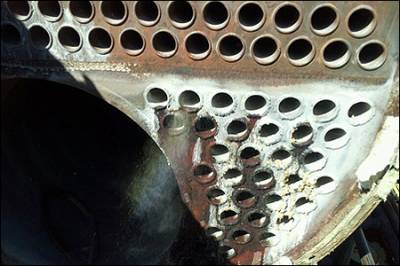Proper treatment of feedwater is the most important task in operating any boiler. The feedwater is made from a mixture of fresh water and recovered condensed water—or return water—which is purified in a multitude of degrees. When steam is released from a boiler, the minerals and gases contained in the heated water become concentrated and form deposits that become hazardous to the boiler and its connected components. These deposits result in poor heat transfer, reduced efficiency, scale, and biological fouling. Scale that collects and forms inside the boiler has lower ability to transfer heat than steel and will raise the metal tube temperatures, creating blisters and overheating failures. As the gases dissolve, oxygen, carbon dioxide, and ammonia will react with the metals in the boiler system and lead to corrosion.
To protect your boiler from these harmful contaminants, it is vital that proper chemicals, water analysis and blowdown procedures are correctly followed at all times. Contact a local reputable boiler chemical specialist, such as Garratt Callahan Company, for more information on these procedures and requirements.

Damage to boiler tubes due to improper feedwater treatment